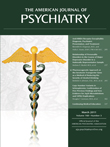Overactive Error-Related Brain Activity as a Candidate Endophenotype for Obsessive-Compulsive Disorder: Evidence From Unaffected First-Degree Relatives
Abstract
Objective:
Hyperactivity in frontal-striatal circuits is assumed to be involved in the pathophysiology of obsessive-compulsive disorder (OCD). In line with that, electrocortical correlates of overactive performance monitoring have been found to be associated with OCD independent from symptom state. The purpose of the present study was to elucidate whether overactive performance monitoring may represent a candidate endophenotype for OCD. In this case, unaffected first-degree relatives of OCD patients should also show this trait.
Method:
Amplitudes of the error-related negativity and the correct-related negativity in the event-related brain potential during a flanker task were used to assess performance monitoring in three carefully matched groups: 30 patients with OCD, 30 unaffected first-degree relatives of OCD patients, and 30 healthy comparison subjects.
Results:
Relative to the healthy comparison subjects, both unaffected first-degree relatives and OCD patients showed increased error-related brain potentials. No significant correlation was obtained between amplitudes and symptom severity measures, neither in patients nor in first-degree relatives.
Conclusions:
Increased error-related brain potentials were observed not only in OCD patients but also in unaffected first-degree relatives. Overactive error monitoring may reflect a trait marker for OCD that is independent of the presence of clinical symptoms. Thus, enhanced error-related brain activity represents a candidate neurocognitive endophenotype for OCD.



